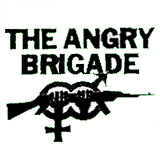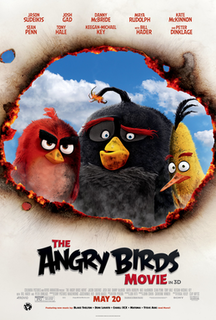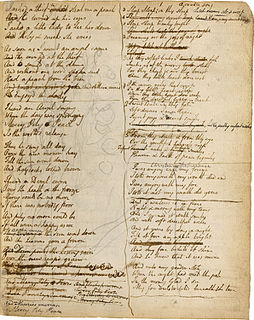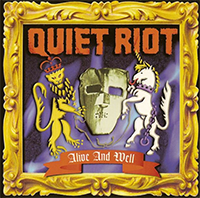
The Angry Brigade was a left-wing revolutionary group responsible for a series of bomb attacks in England between 1970 and 1972.
The "angry young men" were a group of mostly working- and middle-class British playwrights and novelists who became prominent in the 1950s. The group's leading figures included John Osborne and Kingsley Amis. The phrase was originally coined by the Royal Court Theatre's press officer in order to promote Osborne's 1956 play Look Back in Anger. It is thought to be derived from the autobiography of Leslie Paul, founder of the Woodcraft Folk, whose Angry Young Man was published in 1951.

Look Back in Anger (1956) is a realist play written by John Osborne. It focuses on the life and marital struggles of an intelligent and educated but disaffected young man of working class origin, Jimmy Porter, and his equally competent yet impassive upper-middle-class wife Alison. The supporting characters include Cliff Lewis, an amiable Welsh lodger who attempts to keep the peace, and Helena Charles, Alison's snobbish friend.

Kitchen sink realism is a British cultural movement that developed in the late 1950s and early 1960s in theatre, art, novels, film, and television plays, whose protagonists usually could be described as "angry young men" who were disillusioned with modern society. It used a style of social realism, which depicted the domestic situations of working class Britons, living in cramped rented accommodation and spending their off-hours drinking in grimy pubs, to explore controversial social and political issues ranging from abortion to homelessness. The harsh, realistic style contrasted sharply with the escapism of the previous generation's so-called "well-made plays".

Dr. Jekyll and Mr. Hyde is a 1988 side-scrolling action video game for the Nintendo Entertainment System loosely based on the novella Strange Case of Dr Jekyll and Mr Hyde. Gameplay alternates between the characters of Dr. Jekyll and Mr. Hyde based on the player's ability to either avoid or cause damage.

Angry Kid is an English 1-minute short live action and stop motion animated comedy television series created, directed, written, and designed by Darren Walsh and produced by Aardman Animations for Series 1 and 2 and by Mr Morris Productions for Series 3.
The phrase angry young man, or angry young men, can refer to:

Quentin Dupieux, better known by his stage name Mr. Oizo, is a French electronic musician, DJ and film director, best known for his 1999 single "Flat Beat". His pseudonym is a corruption of the French oiseau, meaning "bird". He is signed to Ed Banger Records and Brainfeeder. Dupieux uses his full name for his cinematographic work, Mr. Oizo being only used for his musical work.
Righteous indignation is typically a reactive emotion of anger over mistreatment, insult, or malice of another. It is akin to what is called the sense of injustice. In some Christian doctrines, righteous anger is considered the only form of anger which is not sinful, e.g., when Jesus drove the money lenders out of the temple.
"Anger" is a 1979 single released by singer Marvin Gaye recorded in 1978 for the album, Here, My Dear. The song was issued in 1979 as a single in Canada but failed to chart there. The song discussed mental anguish and pain over bitterness and talks specifically of angry confrontation, in Gaye's case, not only with his wife but with various other friends and family members. Marvin then tells his audience that someday soon he'll try to live his life Christian-like with the lyric Someday soon I'll hope and pray like Jesus/I'll reach that wiser age/hope I will learn I never profit from things I do in rage. The singer then states that when anger reaches its boiling point and then climaxes, he realizes that he's lost in love. Though it doesn't reference his marriage to Anna Gaye, who is the antagonist throughout the majority of this album, the couple in the song dealt with similar issues as faced in his real-life marriage.

Twelve Angry Months is a concept album by the alternative rock band Local H. It was released on May 13, 2008 on Shout! Factory. The album is about experiences surrounding a relationship breakup, with each track corresponding to a month in the year after the break-up. The title is an allusion to Twelve Angry Men. The first single is "24 Hour Break-Up Session".
The album was scheduled for a UK release on 18 August 2008, however this was delayed for unknown reasons until 25 August 2008.
The song 'Blur' is a revised version of a song that appears on the band's EP The '92 Demos.
Twelve Angry Men is a 1954 teleplay by Reginald Rose for the Studio One anthology American television series. Initially staged as a CBS live production on September 20, 1954, the drama was later rewritten for the stage in 1955 under the same title and again for a feature film, 12 Angry Men (1957). The episode garnered three Emmy Awards for writer Rose, director Franklin Schaffner and Robert Cummings as Best Actor.

"Don't Look Back in Anger" is a song by the English rock band Oasis. It was released on 19 February 1996 as the fifth single from their second studio album, (What's the Story) Morning Glory? (1995). The song was written by the band's guitarist and main songwriter, Noel Gallagher. It became the band's second single to reach number one on the UK Singles Chart, where it also went platinum. "Don't Look Back in Anger" was also the first Oasis single with lead vocals by Noel instead of his brother, Liam.
The angry black woman stereotype is a trope in American society that portrays black women as sassy, ill-mannered, and ill-tempered by nature. Related concepts are the "sapphire" or "sassy black woman".

The Angry Birds Movie is a 2016 computer-animated comedy film based on Rovio Entertainment's video game series of the same name, produced by Columbia Pictures and Rovio Animation, and distributed by Sony Pictures Releasing. It was directed by Clay Kaytis and Fergal Reilly in their directorial debuts and written by Jon Vitti. The film features the voices of Jason Sudeikis, Josh Gad, Danny McBride, Maya Rudolph, Kate McKinnon, Sean Penn, Tony Hale, Keegan-Michael Key, Bill Hader, and Peter Dinklage.

The Notebook of William Blake was used by William Blake as a commonplace book from c.1787 to 1818.
Akrodha literally means "free from anger". It is considered an important virtue in Indian philosophy.












